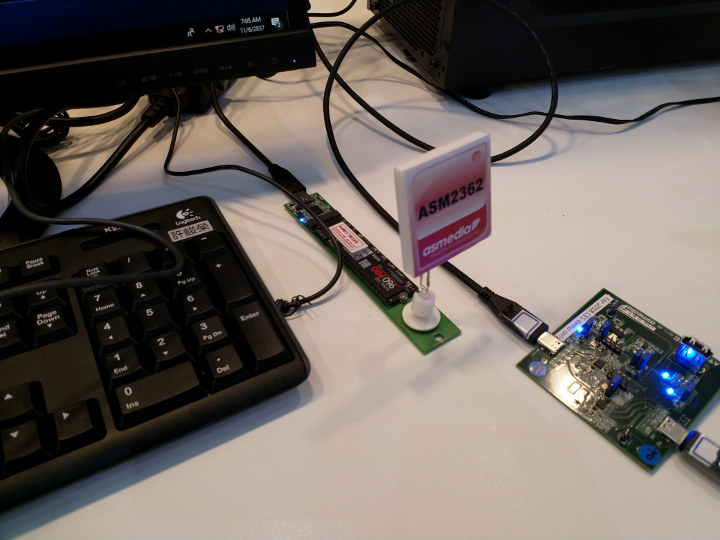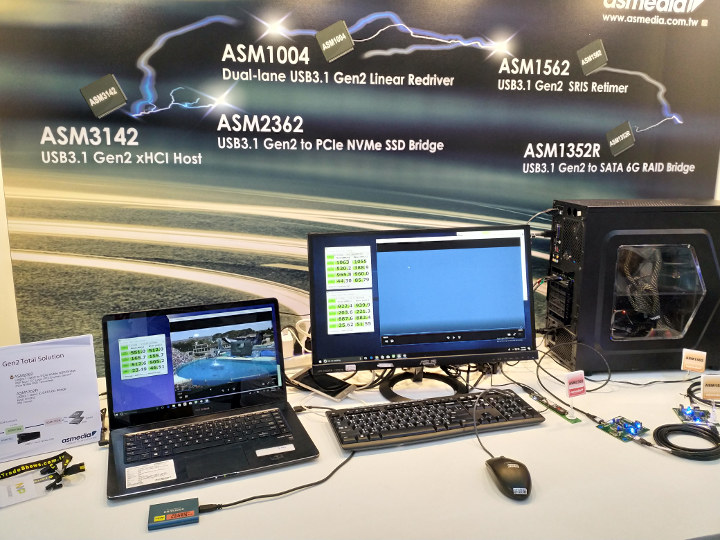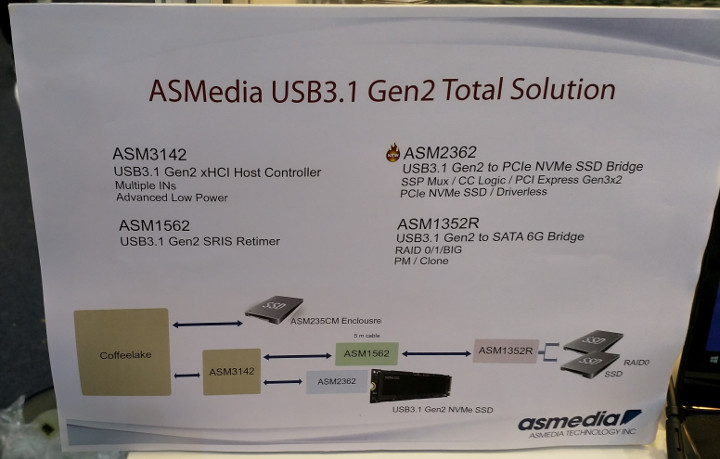Most USB enclosure or expansion drive are designed with a SATA interface that tops out at 6 Gbp. That’s fine in most cases, but if your host computer comes with USB 3.1 Gen2 SuperSpeed 10 Gbps (SuperSpeed+) port capable of even better performance, ASMedia now has a solution for faster USB drives with their ASM2362 USB 3.1 Gen2 to PCIe NVMe SSD chip.

The solution is pretty new, and ASMedia has not setup a product page on their website yet, but they showcased a demo at Computex 2018. In the photo above a Samsung 960 Pro SSD M.2 is connected to another USB board ASMedia – likely based on AS3142 Gen2 xHCI Host Controller – itself connected to a computer with a USB 3.1 Gen2 port. The photo below shows CrystalDiskMark benchmark results comparing ASM2362 USB to NVMe solution to a standard USB to SATA enclosure.

While the USB to SATA SSD achieves around 550 MB/s, the USB 3.1 to PCIe NVMe can deliver around 1GB/s data transfer, which should be close to the 10 Gbps limit once we take into account overheads. So if you need the best sequential performance out of USB 3.1 storage devices, USB NVMe SSD’s will be the way to go once products become available.
ASMedia also had a few other USB 3.1 Gen2 chips at Computex.
Thanks to TLS for the tip and photos.

Jean-Luc started CNX Software in 2010 as a part-time endeavor, before quitting his job as a software engineering manager, and starting to write daily news, and reviews full time later in 2011.
Support CNX Software! Donate via cryptocurrencies, become a Patron on Patreon, or purchase goods on Amazon or Aliexpress. We also use affiliate links in articles to earn commissions if you make a purchase after clicking on those links.






Sick adding all this unnecessary overhead between host and drive. Also TRIM will become a problem and real world performance with mixed workloads (and low queue depths) will suck. I would clearly prefer native PCIe (Thunderbolt 3) instead.
So angry for no reason… So they made a product that allows people to use their “old” NVMe drive that the upgraded to something larger/faster as a portable drive. The fact Chinese companies add these kind of bridge chips to their development boards as a means of adding interfaces the SoC’s don’t have is hardly the controller makers fault, or? There’s a definit demand for this type of product, as right now, if you got a spare NVMe drive, you can’t use it for anything. This is also faster than USB 3.x to SATA, so some people might crave a faster portable drive and this is a solution for that.
If you click on the picture of the benchmarks, you’ll see that the low queue depth scores are actually quite good, although that’s using ASMedia’s own host controller with a PCIe 3.0 x2 interface. With the Intel host controller the numbers aren’t as good.
Seriously: I don’t care about those synthetic benchmark numbers. I care about being able to use TRIM and as already said I care about real world performance (mixed workloads — read and write at the same time — with low queue depths). So once fio numbers with realistic workloads are available we might talk again.
And of course I want to attach PCIe devices via PCIe without an artificial USB bottleneck in between. Almost all NVMe benefits are gone when USB/UAS is used between host and drive enclosure.
thessdreview.com reported about the other similar chip (JMS583 also shown at Computex but not referenced here for reasons unknown to me) and will test soon since they got a sample from JMicron.
I didn’t see JMicron at the show. Reason enough? Not all companies are displaying products in public at the show. Looks like JMicron is using the same ASMedia host controller though.
There is, I did saw JMS583 at the show, and also note that it is already on the market.
I just brought one from China.
> Looks like JMicron is using the same ASMedia host controller though.
JMicron was using the older ASM2142 for their own benchmarks while ASMedia chose the (more energy efficient) successor. But this only illustrates that for real world performance the type of USB host controller matters (usually Intel) so that all these published benchmark scores are numbers without meaning anyway if your host is not already equipped with such a good ASMedia USB controller (it would be rather stupid to add an USB controller as PCIe card if we can get mechanical PCIe to M.2 adapters for less than 10 bucks that will perform magnitudes better)
Just saw that JEYI already has JMS583 devices ready for purchase… hopefully taking care of improved heat dissipation otherwise performance will suck even more since those all those M.2 SSDs are prone to throttling.
It could be intersting if we could hook up an external GPU on it
The technology to attach PCIe devices to a cable exists already since 7 years. Of course it’s not USB based and even with Thunderbolt 3 maximum bandwidth is somewhat limited.
Sorry? You want to do what? So the speed of this chip is like two PCIe 2.0 lanes (bandwidth wise) and you already get reduced performance from Thunderbolt which is generally the same as four PCIe 3.0 lanes. I mean, sure, it might work well enough to get a picture on a screen, but not much else. That said, I believe this is for storage only and won’t work with other types of PCIe devices.
> I believe this is for storage only and won’t work with other types of PCIe devices
The ASM2362 as well as JMS583 will only work with NVMe SSDs (not storage in general — an old
Samsung SM951 M.2 PCIe SSD will *not* work since using AHCI protocol instead of NVMe). The chipset has to ‘translate’ between NVMe and old and boring USB protocols like UAS or BOT (totally trashing NVMe performance but people who only focus on irrelevant marketing benchmark numbers like sequential transfer speeds with maximum queue depth won’t care of course.)
BTW: These things (eGPU connected via Thunderbolt 3) do exist: https://www.gamingscan.com/best-external-graphics-card/
Hi Guys, so I bought JMS583 based JEYI enclosure and had Toshiba XG3 installed
My windows 10 XPS 9550 detects it as JEYI NVME SCSI Disk Drive and it is using generic UAS mass storage driver
But, I’m could not detect the drive through disk management and I’m seeing all sort of errors on event viewer
I’d appreciate if anyone can point out what is wrong and if it require some kind of bridge driver – I don’t think it would work using UAS generic driver?
Device USB\VID_152D&PID_0583\MSFT300123456789ABC was not migrated due to partial or ambiguous match.
Last Device Instance Id: USB\VID_357D&PID_7788\MSFT30000012345678
Class Guid: {4d36e97b-e325-11ce-bfc1-08002be10318}
Location Path:
Migration Rank: 0xF000FFFF0000F120
Present: false
Status: 0xC0000719
Device USB\VID_152D&PID_0583\MSFT300123456789ABC had a problem starting.
Driver Name: uaspstor.inf
Class Guid: {4d36e97b-e325-11ce-bfc1-08002be10318}
Service: UASPStor
Lower Filters:
Upper Filters:
Problem: 0xA
Problem Status: 0xC0000001
Device SCSI\Disk&Ven_JEYI&Prod_NVME\000000 was not migrated due to partial or ambiguous match.
Last Device Instance Id: SCSI\Disk&Ven_TOSHIBA&Prod_MQ01ABD100\000000
Class Guid: {4d36e967-e325-11ce-bfc1-08002be10318}
Location Path:
Migration Rank: 0xF000FC000000F020
Present: false
Status: 0xC0000719
The “not migrated due to partial or ambiguous match” appears to be a driver error based on web search results.
I can’t find Windows 10 drivers for JMS583 online, maybe try to ask your seller if possible.
If a related post we also discussed potential power issues in comments @ https://www.cnx-software.com/2018/06/12/lm-902-usb3-1-gen2-to-nvme-pcie-m-2-ssd-enclosure/, but it does not looks to be your problem here.